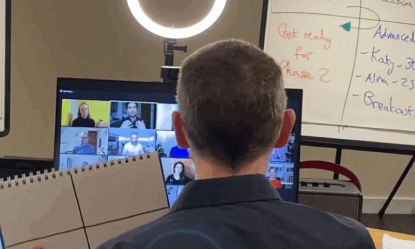Fear. It’s a feeling we’ve all experienced. Imagine this: You’ve seventeen million people waiting for you to deliver a 3-and-a-half-minute presentation, without notes, autocue or rehearsal and you’re expected to do so with engagement, interest, and poise. Probably one of the toughest jobs in broadcasting and I’ve been put in the position many times.
So I know “The Fear.”
In this blog, I’m going to review the reasons why so many of us find public speaking so daunting – glossophobia, or fear of public speaking, affects up to 75% of the population, (National Institute of Health) – and provide some insights into how I, and many of the people I’ve helped, overcome these fears and deliver outstanding performances.
Whether you’re standing in front of a crowd giving a presentation or facing a difficult conversation with a colleague, fear can grip you in ways that make communication feel nearly impossible. Many people avoid these situations altogether, not because they lack knowledge or technical ability, but because they haven’t mastered one critical area: soft skills.
But what makes these so-called “soft skills” so much harder to learn than technical ones? Why do we, as humans, often struggle more with conversations than calculations?
Let’s dive into why soft skills, like communication, emotional intelligence, and empathy, are the most challenging but essential traits to develop.
The Nature of Fear in Communication
Fear is often the biggest roadblock when it comes to presenting or navigating tough conversations. This fear can stem from several sources:
- Fear of Judgment: What will others think? Will I sound foolish? This social anxiety can freeze even the most competent person in their tracks.
- Fear of Failure: The idea of making a mistake in public is enough to keep many from even trying. When you can’t guarantee success, fear magnifies the uncertainty.
- Fear of Conflict: In difficult conversations, the fear that the other person will react negatively or that emotions will spiral out of control often prevents people from addressing important issues.
All of these anxieties are rooted in our deep social instincts. We crave connection but fear rejection. We want to succeed but dread failure. As Dr Alison Wood Brooks at the Harvard Business School explains, “The fear of public speaking comes from the fear of being judged, humiliated or rejected.” And here’s where soft skills come into play.
What Exactly Makes Soft Skills So Challenging?
Soft skills are harder to master than hard skills because they involve self-awareness, emotional control, and understanding others. Daniel Goleman, author of Emotional Intelligence, says, “Soft skills require the ability to navigate human interactions, which are far more complex than learning a technical skill.” Unlike hard skills then, where there’s a clear path to follow, soft skills don’t have a set process. Each conversation is different, requiring you to adapt on the spot.
Mastering these skills can be mentally draining because you’re constantly managing not only your emotions but also those of others. This emotional juggling takes energy and focus, whether you’re reading body language or calming your nerves before a presentation. Dr. Travis Bradberry remarks in his book Emotional Intelligence 2.0, how “Mastering soft skills means managing one’s own emotions while understanding and responding to the emotions of others.”
Soft skills also demand vulnerability. In research by Professor Brene Brown reported in her book Daring Greatly, she notes how, “Vulnerability is not winning or losing; it’s having the courage to show up and be seen when we have no control over the outcome.” In a similar vein, Professor Amy Edmondson of Harvard Business School explains, “In every interaction, the willingness to be vulnerable builds trust and fosters stronger connections, making it a key component in effective communication.” The point is this: Effective communication isn’t about perfection—it’s about being authentic and relatable. But opening yourself up in this way feels risky, which adds to the challenge.
Unlike hard skills, which can be practiced alone, soft skills require real interactions. This often means stepping into uncomfortable situations—speaking up, handling conflict, or presenting ideas that may be challenged. It’s only through facing these discomforts that you improve.
Lastly, feedback with soft skills is unpredictable. In hard skills, you know if something works or not. With soft skills, the outcome can vary depending on the person or situation, making progress feel uncertain and harder to track.
How to Break Through the Fear and Master Soft Skills
If fear is the barrier, what’s the solution? How do you push through the discomfort and become a more skilled communicator? Here are actionable tips to help you along the way:
1. Start Small and Build Confidence
You don’t need to dive into the deep end right away. Start with low-stakes situations to build confidence. Speak up in smaller meetings before taking on larger presentations. Address minor issues with colleagues before tackling more difficult conversations. As your confidence grows, so will your ability to manage fear.
2. Shift Your Focus from Perfection to Progress
Perfectionism paralyses. Instead of aiming to be flawless in every presentation or conversation, focus on making gradual improvements. Small wins—like staying calm under pressure or expressing a difficult thought more clearly—will add up over time.
3. Embrace Vulnerability as a Strength
Vulnerability isn’t a weakness; it’s what makes you relatable. When people see that you’re human, they’re more likely to connect with you, whether you’re leading a meeting or resolving a conflict. Try reframing your fear of vulnerability into an opportunity to build stronger relationships.
4. Learn Active Listening
Stephen Covey, author of The 7 Habits of Highly Effective People, makes this contribution to the idea of active listening: “It is one of the most important skills for effective communication. It involves listening with all your senses, not just hearing words but understanding the emotions and intent behind them.” He’s making the point that most communication fails because we spend more time preparing our response than actually listening. Practice active listening: focus on what the other person is saying without immediately forming your reply. This not only reduces the pressure on you but also makes the other person feel heard, which defuses tension.
5. Seek Feedback and Reflect
Because soft skills rely heavily on interpretation, seek feedback from those you trust. After a conversation or presentation, ask someone how you came across. What worked? What didn’t? Reflection will help you adjust your approach and improve over time. Remember this insight from Ginni Romeety, former CEO of IBM: “Growth and comfort do not coexist. Pushing through discomfort is the key to developing emotional intelligence and mastering interpersonal skills.”
The Payoff: Why Soft Skills Matter
Mastering soft skills may be harder, but the rewards are enormous. When you improve your communication, emotional intelligence, and interpersonal abilities, you unlock greater success in both your personal and professional life. You’ll navigate tricky conversations with more ease, connect more deeply with others, and lead with confidence in any situation.
Dr. Abigail Marsh, psychologist and professor at Georgetown University has this advice for you: “The more you practice stepping out of your comfort zone, the more your brain recognises these experiences as non-threatening, making it easier to take on similar challenges in the future.”
The key to conquering fear and mastering soft skills lies in embracing the discomfort that comes with growth. It’s about recognizing that every challenging conversation, every nerve-wracking presentation, is an opportunity to sharpen your abilities and expand your comfort zone.
So, the next time fear rears its head before a difficult conversation or a big presentation, remember: the hardest skills to learn are often the most rewarding.
Fear may be the greatest obstacle, but it’s also the best teacher. Start small, stay committed, and soon, what once felt like a monumental challenge will become a skill you wield with confidence.
References
- National Institute of Mental Health. Public Speaking Anxiety and Glossophobia Statistics. Retrieved from www.nimh.nih.gov.
- Dr. Alison Wood Brooks, Harvard Business School. The Role of Emotion in Public Speaking Anxiety. Published in Harvard Business Review, 2014.
- Goleman, Daniel. Emotional Intelligence: Why It Can Matter More Than IQ. Bantam Books, 1995.
- Dr. Travis Bradberry, Emotional Intelligence 2.0. TalentSmart, 2009.
- Brown, Brené. Daring Greatly: How the Courage to Be Vulnerable Transforms the Way We Live, Love, Parent, and Lead. Gotham Books, 2012.
- Edmondson, Amy. The Fearless Organization: Creating Psychological Safety in the Workplace for Learning, Innovation, and Growth. Wiley, 2018.
- Covey, Stephen R. The 7 Habits of Highly Effective People: Powerful Lessons in Personal Change. Free Press, 1989.
- Rometty, Ginni. On Leadership and Growth Through Discomfort. Interview with Harvard Business Review, 2019.
- Marsh, Abigail. The Neuroscience of Courage and Vulnerability. Georgetown University Lecture, 2017.


















